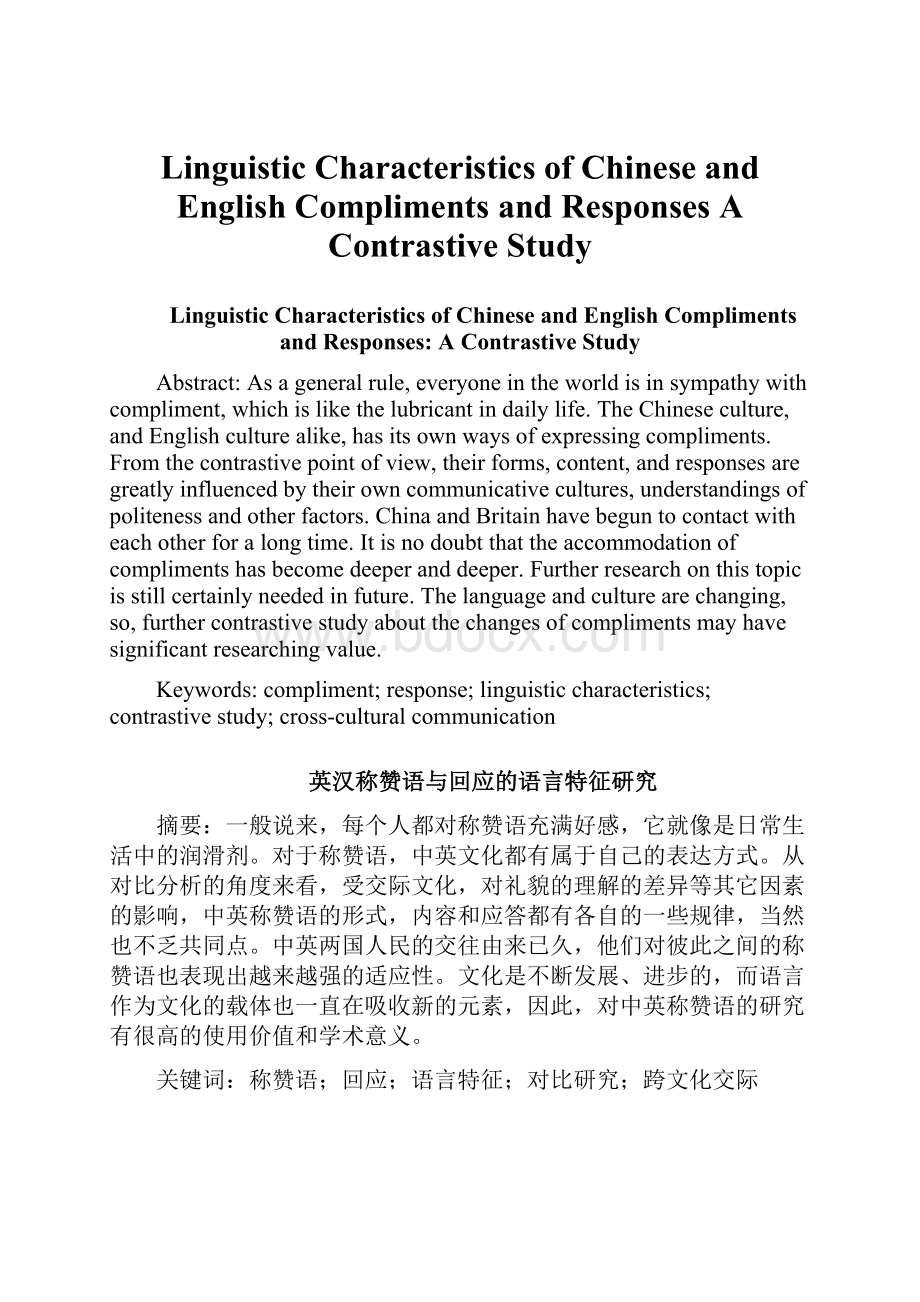Linguistic Characteristics of Chinese and English Compliments and Responses A Contrastive Study.docx
《Linguistic Characteristics of Chinese and English Compliments and Responses A Contrastive Study.docx》由会员分享,可在线阅读,更多相关《Linguistic Characteristics of Chinese and English Compliments and Responses A Contrastive Study.docx(19页珍藏版)》请在冰豆网上搜索。

LinguisticCharacteristicsofChineseandEnglishComplimentsandResponsesAContrastiveStudy
LinguisticCharacteristicsofChineseandEnglishComplimentsandResponses:
AContrastiveStudy
Abstract:
Asageneralrule,everyoneintheworldisinsympathywithcompliment,whichislikethelubricantindailylife.TheChineseculture,andEnglishculturealike,hasitsownwaysofexpressingcompliments.Fromthecontrastivepointofview,theirforms,content,andresponsesaregreatlyinfluencedbytheirowncommunicativecultures,understandingsofpolitenessandotherfactors.ChinaandBritainhavebeguntocontactwitheachotherforalongtime.Itisnodoubtthattheaccommodationofcomplimentshasbecomedeeperanddeeper.Furtherresearchonthistopicisstillcertainlyneededinfuture.Thelanguageandculturearechanging,so,furthercontrastivestudyaboutthechangesofcomplimentsmayhavesignificantresearchingvalue.
Keywords:
compliment;response;linguisticcharacteristics;contrastivestudy;cross-culturalcommunication
英汉称赞语与回应的语言特征研究
摘要:
一般说来,每个人都对称赞语充满好感,它就像是日常生活中的润滑剂。
对于称赞语,中英文化都有属于自己的表达方式。
从对比分析的角度来看,受交际文化,对礼貌的理解的差异等其它因素的影响,中英称赞语的形式,内容和应答都有各自的一些规律,当然也不乏共同点。
中英两国人民的交往由来已久,他们对彼此之间的称赞语也表现出越来越强的适应性。
文化是不断发展、进步的,而语言作为文化的载体也一直在吸收新的元素,因此,对中英称赞语的研究有很高的使用价值和学术意义。
关键词:
称赞语;回应;语言特征;对比研究;跨文化交际
Contents
1.Introduction……………....……………………………………………………….1
2.Compliments……………………………………………………………………...2
2.1Thedenotativeandconnotativemeaningofcompliment…………………......2
2.2Classificationsofcompliment…………………………………………………..2
2.3Communicativefunctionsofcompliment...........................................................3
3.ContrastiveStudyofCompliments….............................................................4
3.1Commons………………………………………………………………………...4
3.1.1Inform………………………………………………………………………..4
3.1.2Incontent……………………………………………………………………..6
3.2Differences……………………………………………………………………….7
3.2.1Inform………………………………………………………………………..7
3.2.2Incontent……………………………………………………………………..7
4.ContrastiveStudyofResponses………………………………………………8
4.1Chinesecomplimentresponses……………………………………………….....8
4.2Englishcomplimentresponses………………………………………………....10
5.CurrentDevelopmentsofComplimentsandResponses……………....11
5.1Culturalbackgroundbeingunderstooddeeper…………………………........11
5.2Conceptualizationofcomplimentsrefreshed………………………………....12
6.AnalysisofFactorsLeadingtotheDifferencesinCompliments……13
6.1Communicativeculture………………………………………………………...13
6.2Politeness………………………………………………………………………..13
6.3Interlocutor’srelationship……………………………………………………..14
7.Conclusion………………………………………………………………………..14
References………………………………………….………………………….…….16
Acknowledgements..................................................................................................17
1.Introduction
Acomplimentisafrequentspeechactoranactsequence(Wolfson,1989:
1),anditis“apolitespeechactwhichexplicitlyorimplicitlyattributescredittosomeoneotherthanthespeaker,usuallythepersonaddressed,forsome‘good’(possession,characteristics,skill,etc.)whichispositivelyvaluedbythespeakerandhearer”Holmes’s(1988:
446).Itfollowsnaturallythatcomplimentisimportantspeechactthatplaysavitalroleinpeople’sdailyinteraction.Influencedbyculturalbackgroundandotherfactors,however,theChineseandtheEnglishhavetheirownunderstandingofandattitudestowardscomplimentsandcomplimentresponses.
InordertouseChineseandEnglishcomplimentsappropriately,weshouldpayattentiontotherelationshipbetweencultureandlanguage.Withoutexaggeration,languageisthebasictoolforpeople’scommunication,ononehand,welearnaboutotherpeoplethroughthecontenttheyexpressandthewaythattheysay;ontheotherhand,welearnaboutourselvesthroughthereactiongivenbyourlisteners.Cultureis“thatcomplexwholewhichincludesknowledge,belief,art,morals,law,customandanyothercapabilitiesandhabitsacquiredbymanasamemberofsociety”(Tyler,1871:
1),or“thecumulativedepositofknowledge,experience,beliefs,values,attitudes,meanings,hierarchies,religion,notionsoftime,roles,spatialrelations,conceptsoftheuniverse,andmaterialobjectsandpossessionsacquiredbyagroupofpeopleinthecourseofgenerationsthroughindividualandgroupstriving”(SamovarandPorter,2000:
12).Languageisaminiatureofculture,andtosomeextentcultureconstrainslanguage’sdevelopment(Sapir,1949).Inconclusion,cultureandlanguagearekeenlyrelatedtoeachother.Suchbeingthecase,iftheChineseandtheEnglishwanttocommunicatewitheachotherwithoutobstacles,theyshouldhavesomeknowledgeofculturalconnotationshiddenbehindtheChineseandEnglishlanguages,especiallytheircompliments’customsandlinguisticcharacteristics.ThisthesisisthusmotivatedlyacontrastivestudyofChineseandEnglishcomplimentsfromculturaldistinctions.
2.Compliment
2.1Thedenotativeandconnotativemeaningofcompliment
Eachlexicalwordandphrasehasitsdenotativemeaningandconnotativemeaning.Denotativemeaning,orliteralmeaning,isgenerallydefinedinthedictionary.Thereforeitisreadilyfound,inWebster’sDictionaryoftheEnglishLanguage(1979)thatthedenotativemeaningof‘compliment’is“topraise,toflatterbyexpressionsofapprobation,esteemorrespect,tocongratulateorpayacompliment”.Here,“topraise”inEnglishand“表扬,称赞”inChinesebothstandforlaudwithacommendatorysense;incontrast,both“toflatter”inEnglishand“恭维,奉承,阿谀”inChineserepresentadulationwithaderogatorysenses.Fromthispointofview,thedenotativemeaningsofChineseandEnglishcomplimentshavesimilarities.
Denotativemeaningisthebasisofunderstandinganditisgenerallystable.Comparedwithit,connotativemeaningisaffectedbysomeobjectivefactors,suchaspeople’seducationallevel,attitudestowardslifeandtheworld.Torecap,connotativemeaningisculturallybiased,reflectingnotonlyparticularculturalbackgroundofonenationbutalsoitspsychologicallyculturaltendency,andfinallydeterminingthenation’scommunicationbehaviors.Whenitcomestocompliment’sconnotativemeaning,intermsofChineseandEnglishcompliments,traditionallyandsimplyspeaking,theEnglishtendtoacceptcomplimentswithgrace,becausetheirstrategiesarecharacterizedbyacceptancewhichisgovernedbyLeech’sAgreementMaxim;whereastheChinesearelikelytodenycomplimentsoutofmodesty,fortheirstrategiesarecharacterizedbycomplimentrejectionandself-denigrationwhicharemotivatedbyLeech’sModestyMaxim(WangandTsai,2003:
127).
2.2Classificationsofcompliment
Assaidabove,acomplimentisaspeechactthatisaccomplishedeitherexplicitlyorimplicitlytoexpressadmirationorapprovalforsomegoodoftheaddressee.Therefore,complimentisnotmonotonousbutdiversified.Basedonthehonestyaspect,complimentscanbeclassifiedintotwogroups,oneissincerecompliment,andtheotherisinsincerecompliment(Li,1999:
62).Toagreatextend,theformerisagreeingreasonably;furthermore,itisakindofappreciationwhichcomesfromheart.Forexample,“Youworkwasoutstanding!
”“Youreallydidagoodjob!
”However,thelaterdisobeystheTruthPrinciple.Thatmeans,oneusesthecomplimentinordertoachieveacertainorunknownpurpose.Forexample,“Howmarvelousthemealyoucooked!
”Theimplicationofthisstatementisthat:
Whatanawfulmealyoucooked.Ofcourse,wecansortthecomplimentfromotherrespects,andIwillgiveamoredetailedstudyinthefollowinglengthofwriting.
2.3Communicativefunctionsofcompliment.
Itisgenerallyassumedthatcomplimentisoneofthemostfrequentlypolitespeechactsindailyverbalinteraction,anditsvitalcommunicativefunctionsarebeyonddoubt.Complimentsestablishsolidaritywiththeinterlocutorsbythespeaker’spraisingsomefeaturesrelevanttothelistener(WolfsonandManes,1981:
115-132).Thatis,complimentscanbetreatedaspositivelyaffectivespeechactsdirectedtotheaddresseethatservetoincreaseorconsolidatethesolidaritybetweenthespeakerandlistener.Torecap,complimentsappearedtobefunctionallycomplexspeechactswhichservedassolidaritysignals,commentingonfriendships,attenuatingdemands,smoothingruffledfeathersandbridginggapscreatedbyotherwiseoffenses(Holmes,1988:
464).
Inaddition,thefunctionsofcomplimentingarevaried.Fromtheethnographicpointofview,thefunctionofcomplimentsvariesfromculturetoculture,communitytocommunity.Butnomatterwhatfunctionsdocomplimentshave,theyaregenerallydescribedaspositivepolitenessstrategiesservingtoincreaseorconsolidatethesolidaritybetweenthespeakerandaddressee.Weusecomplimentsbecauseweintendtomakeothersfeelgoodandthenhavegoodinteractionswiththem.
Specificallyspeaking,forinterpersonalrelations,complimentscanpromotefriendshipandunderstanding,raisecommunicationeffects;forcountries,properuseofcomplimentsmaybeakeytocertaindiplomaticissue.JustasWolfsonsaid,complimentshavebeensaidto‘cream’thesocialwheelsandthustoserveassociallubricantthatcreateormaintainrapport(Wolfson,1983:
89).
3.ContrastiveStudyofCompliments
AccordingtoShih’s(1986:
35)studyonacomparisonbetweenthewayscomplimentsfunctioninEnglishandinChinese,complimentingbehaviorisquitesimilaracrosslanguagesexceptthatthecomplimenteditemsmaydiffersomewhataccordingtowhatishighlyvaluedintheculture.Withthefastdevelopmentofcommunicationandcontactbetweenpeopleofdifferentnationsandregions,contrastivestudybecomemoreandmoremeaningfulandimportantinacademicsenseaswellasin